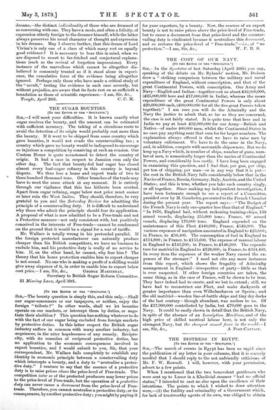THE COST OF OUR NAVY.
[To THE EDITOR OF THE " SPECTATOR."] Sia,—In the Spectator of last Saturday (April 26th) you say, speaking of the debate on Mr. Rylands' motion, Mr. Dodson drew a " striking comparison between the military and naval expenditure of England, without conscription, and that of the great Continental Powers, with conscription. Our Army and Navy—English and Indian—together cost us about £42,000,000, (e25,000,000 here and £17,000,000 in India), whereas the mean expenditure of the great Continental Powers is only about £20,000,000 each, (E90,000,000 for all the five great Powers taken together)." I am sure you will do the Admiralty and the Navy the justice to admit that, as far as they are concerned, the case is not fairly stated. It is quite true that here and in India we pay at least £32,000,000 for our Army—British and Native—of under 44)0,000 men, whilst the Continental States in no case pay anything near that sum for far larger numbers. The explanation always offered is that we have to raise men by voluntary enlistment. We have to do the same in the Navy, and, in addition, compete with mercantile shipowners. But we do keep up a Navy which, in number of ships, number of guns, num- ber of men, is numerically larger than the navies of Continental Powers, and considerably less costly. I have long been engaged in examining this question, and I find that, per gun, per ship, per ton of shipping, per man—or in any way that it is put— the cost in the British Navy falls considerably below that in the Navies of France, Russia, Germany, Italy, Austria, and the United States ; and this is true, whether you take each country singly, or all together. Since making my independent investigation, I have been fortunate enough to see a report of a Committee, presided over by M. Gambetta, presented to the French Chamber during the present year. The report says :—" The Budget of the French Navy is only one-quarter less than that of England." " In 1876, England had, without reckoning training-ships, 130 armed vessels, displacing 255,000 tons ; France, 89 armed vessels, displacing 170,000 tons. England expended on the maintenance of this Fleet £440,000; France, £540,000. The various expenses of navigation amountedin England to £23,000 ; in France, to £50,400. The consumption of fuel in England to £114,800 ; in France, to £153,600. The expense of manual labour in England to £143,200; in France, to £148,200. The expendi- ture for materiel in England to £128,000 ; in France, to £344,400. In every item the expenses of the weaker Navy exceed the ex- penses of the stronger." I need not cite any more instances from this report, which shows the frugality of Admiralty management in England—irrespective of party—little as that is ever suspected. If other foreign countries are taken, the same thing, as in the case of France, will be shown to be true. They have indeed had to create, and we but to extend ; still, we have had to reconstruct our Fleet, and make dockyards of greater importance than even Wilhelmshaven or Spezia ; and the old materiel—wooden line-of-battle ships and tiny dry docks of the last century—though abundant, was useless to us. Of the £17,000,000 contributed by India, but £70,000 goes to the Navy. It could be easily shown in detail that the British Navy, in spite of the absence of an Inscription Maritime, and of the high price of skilled nautical labour here, is not only the strongest Navy, but the cheapest armed force in the grorld.—I


































 Previous page
Previous page